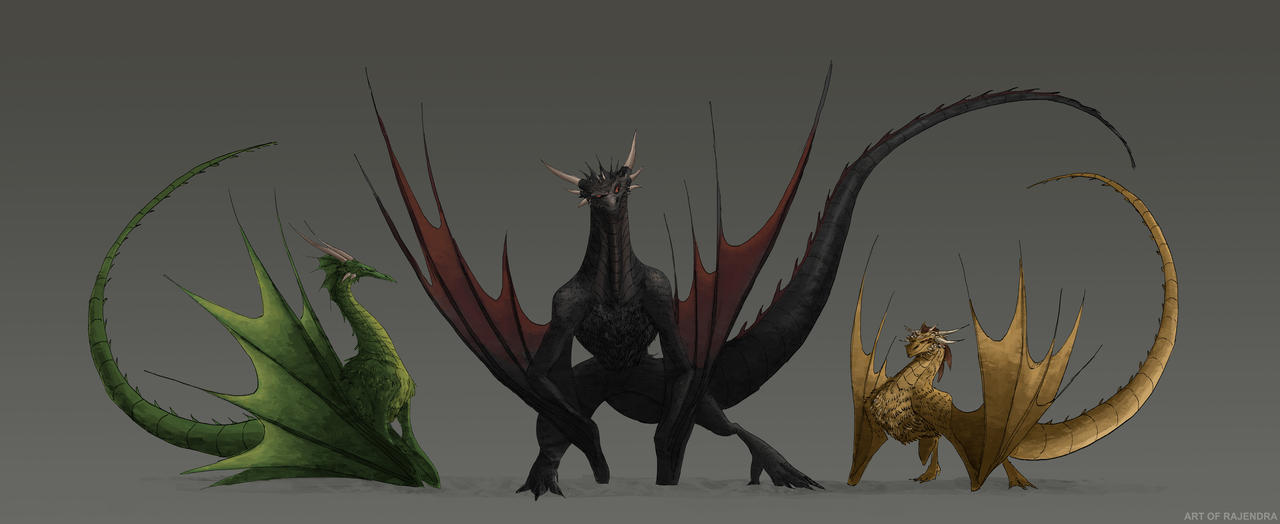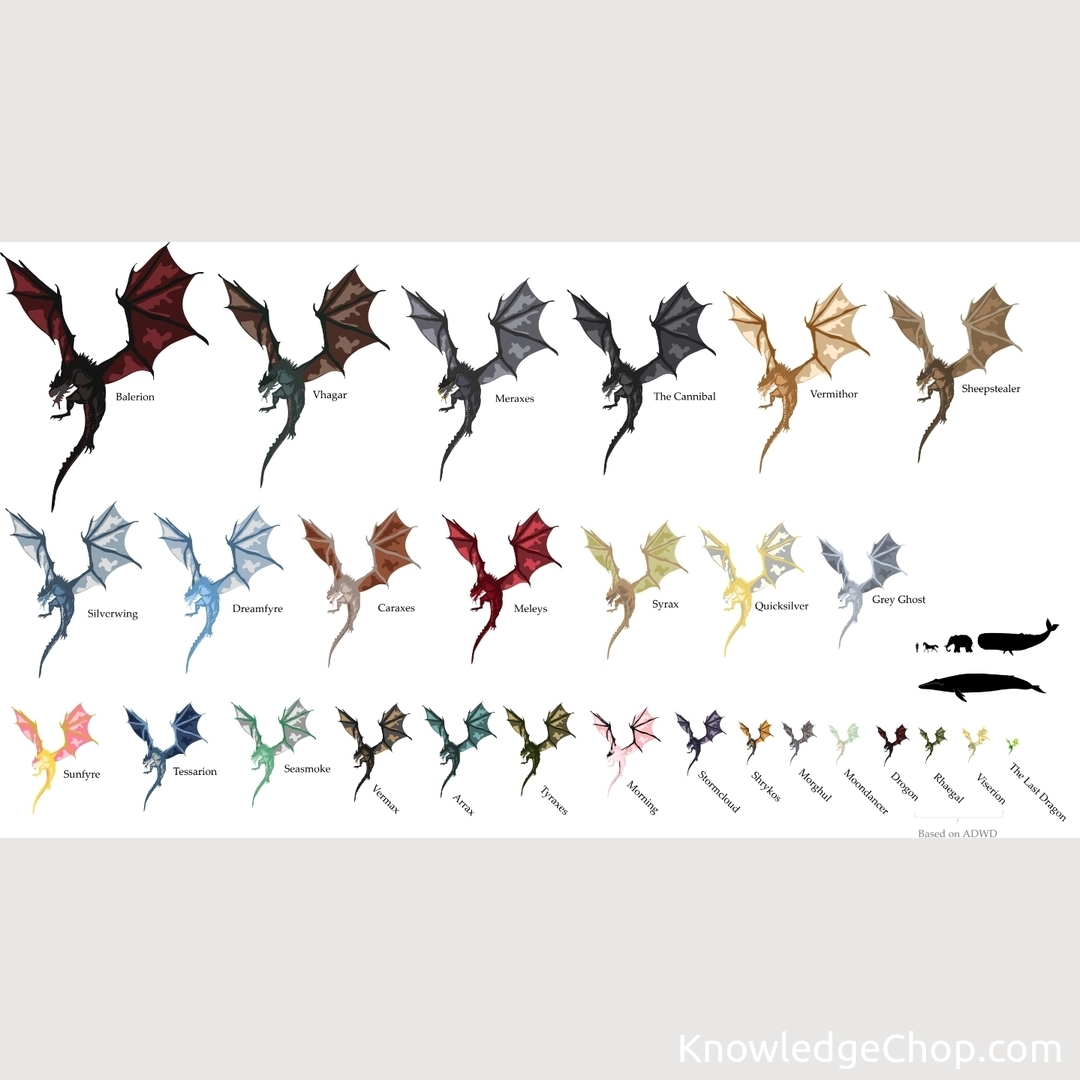The world of Game of Thrones has captivated audiences globally with its intricate storylines and unforgettable characters. Among the most compelling elements of the series are the dragons, which play a critical role in the unfolding drama. These mythical creatures, with their fiery breath and majestic presence, have become symbols of power, freedom, and destiny. In this article, we will delve deeply into the names of the Game of Thrones dragons and explore their significance within the series.
From their first appearance in the early seasons to their pivotal roles in the climactic battles, the dragons have been at the heart of some of the most memorable moments in Game of Thrones. Their names not only reflect their unique personalities but also the profound bond they share with their mother, Daenerys Targaryen. By understanding the meaning behind these names, fans can gain a richer appreciation for the depth and complexity of the story.
Whether you're an ardent fan of the series or someone who's curious about the world of Westeros, this article will provide you with comprehensive insights into the dragons. We'll explore their origins, their evolution throughout the series, and the cultural significance of their names. Join us as we journey into the fiery world of the dragons of Game of Thrones.
Read also:Transform Your Living Space With The Lelandwood Sectional
Table of Contents:
- The Life of Daenerys Targaryen
- The Names of the Game of Thrones Dragons
- The Origins of the Dragons
- The Bond Between Daenerys and the Dragons
- The Meaning Behind the Dragon Names
- Dragons in Key Battles
- The Growth and Evolution of the Dragons
- The Fate of the Dragons
- The Cultural Significance of Dragons
- Frequently Asked Questions
The Life of Daenerys Targaryen
Daenerys Targaryen: The Mother of Dragons
Before we explore the names of the dragons, it's essential to understand the life of Daenerys Targaryen, the woman who brought them into existence. Born into the illustrious House of Targaryen, Daenerys was the last of her bloodline after the fall of King's Landing. Her early life was marked by exile and hardship, but she rose to become one of the most powerful figures in the world of Westeros. Her resilience and determination set the stage for her journey to reclaim the Iron Throne, with the dragons as her greatest allies.
Data and Biodata of Daenerys Targaryen
| Full Name | Daenerys Stormborn of House Targaryen |
|---|---|
| Title | Mother of Dragons, Khaleesi of the Great Grass Sea, Breaker of Chains |
| Place of Birth | Dragonstone |
| Family | Viserys Targaryen (brother), Rhaegar Targaryen (brother) |
| Significance | First to hatch dragons in centuries |
The Names of the Game of Thrones Dragons
The dragons of Game of Thrones are named Drogon, Viserion, and Rhaegal. These names carry deep significance, rooted in the storied history of House Targaryen. Each dragon is named after a member of Daenerys' family, underscoring her connection to her heritage and lineage. These names serve as a tribute to her loved ones and a reminder of her journey.
Who Are the Dragons Named After?
- Drogon: Named after Daenerys' late husband, Khal Drogo, a fierce warrior and leader.
- Viserion: Named after Daenerys' brother, Viserys Targaryen, whose volatile and fiery personality mirrored the dragon's nature.
- Rhaegal: Named after Daenerys' brother, Rhaegar Targaryen, a man of wisdom, grace, and leadership.
The Origins of the Dragons
The dragons were hatched from ancient eggs that Daenerys received as a wedding gift. She placed the eggs in the flames of Khal Drogo's funeral pyre, and from those flames emerged the three dragons. This extraordinary event marked the return of dragons to the world after centuries of extinction, symbolizing a new era for the Targaryen legacy.
Significance of the Hatching
The hatching of the dragons was a transformative moment, not only for Daenerys but for the entire world of Westeros. It signified the rebirth of the Targaryen dynasty and the beginning of Daenerys' quest to reclaim the Iron Throne. The dragons quickly became her closest companions and instruments of her power, shaping the course of her journey.
The Bond Between Daenerys and the Dragons
The bond between Daenerys and her dragons is one of the most compelling relationships in the series. From the moment they hatched, the dragons recognized Daenerys as their mother and followed her commands with unwavering loyalty. This connection was forged through countless hours of nurturing, care, and training, strengthening their bond to a near-telepathic level.
Read also:Comprehensive Guide To Orlando Sanford International Airport Orl
How Did the Bond Form?
Daenerys dedicated herself to the well-being of her dragons, feeding them, protecting them, and training them to obey her commands. Her ability to communicate with them on a deep, almost mystical level was a testament to the strength of their bond. This connection not only solidified her role as the Mother of Dragons but also enhanced her ability to wield their immense power.
The Meaning Behind the Dragon Names
The names of the dragons carry profound meaning, reflecting the personalities of the creatures themselves and the qualities of the people they are named after. Drogon, the largest and most aggressive of the three, embodies the fierce warrior spirit of Khal Drogo. Viserion, with his golden scales, mirrors the fiery and volatile nature of Viserys Targaryen. Rhaegal, the smallest but equally powerful, reflects the wisdom and grace of Rhaegar Targaryen.
Symbolism in the Names
Each name encapsulates not only the personality of the dragon but also the traits of the person it honors. This adds layers of complexity to the story, emphasizing the importance of family and heritage in the world of Game of Thrones. The names serve as a reminder of Daenerys' roots and the legacy she seeks to restore.
Dragons in Key Battles
The dragons played critical roles in several pivotal battles throughout the series. Their presence often altered the course of war, showcasing their immense power and strategic importance. These battles highlighted the dragons' role as both weapons of destruction and symbols of hope.
Notable Battles Involving Dragons
- The Battle of Meereen: The dragons were unleashed on the city, helping Daenerys secure a decisive victory and establish her authority.
- The Battle of the Goldroad: Drogon and Rhaegal were instrumental in defeating the Lannister forces, demonstrating the dragons' overwhelming power.
- The Great War: All three dragons fought in the battle against the Night King, with Viserion tragically falling to the undead, underscoring the risks of wielding such immense power.
The Growth and Evolution of the Dragons
As the series progressed, the dragons grew from small, vulnerable hatchlings into massive, formidable creatures. Their growth mirrored Daenerys' own development, as she transitioned from a young, exiled princess into a powerful queen. This parallel highlighted the symbiotic relationship between the dragons and their mother.
Factors Influencing Dragon Growth
The growth of the dragons was influenced by various factors, including their environment, diet, and the time they spent in flight. Their rapid development was a testament to their magical nature and the strength of their bond with Daenerys. This growth not only enhanced their physical capabilities but also amplified their symbolic significance in the story.
The Fate of the Dragons
The fate of the dragons was a central theme in the final seasons of the series. While Drogon survived and flew off with Daenerys' body, Viserion was turned into an undead wight, and Rhaegal met a tragic end at the hands of Euron Greyjoy. These outcomes underscored the dangers of wielding immense power and the consequences of such choices.
Impact of the Dragons' Fates
The deaths of Viserion and Rhaegal were significant moments in the series, highlighting the risks and sacrifices associated with wielding such immense power. Drogon's survival symbolized the continuation of the Targaryen legacy, even in the absence of its human representative. These events added depth to the story, emphasizing the cyclical nature of power and destiny.
The Cultural Significance of Dragons
In the world of Game of Thrones, dragons are more than mythical creatures; they are symbols of power, fear, and respect. Their presence evokes awe and inspires both admiration and terror, making them central figures in the cultural and political landscape of Westeros.
Dragons in Westerosi Culture
Throughout history, dragons have been revered by the Targaryens and feared by their enemies. Their return to the world marked a significant shift in the balance of power, as Daenerys used them to challenge the established order and bring about change. The dragons' presence reshaped the world of Westeros, leaving a lasting impact on its people and history.
Frequently Asked Questions
What Are the Names of the Game of Thrones Dragons?
The names of the dragons are Drogon, Viserion, and Rhaegal, each carrying deep significance and reflecting the personalities of the creatures themselves.
Why Are the Dragons Named After Members of Daenerys' Family?
The dragons are named after significant members of Daenerys' family to honor her heritage and strengthen the bond between her and the creatures. These names serve as a tribute to her loved ones and a reminder of her journey.
What Happened to Viserion?
Viserion was killed by the Night King and resurrected as an undead wight, serving as a weapon in the battle against the living. This tragic fate underscored the dangers of wielding immense power and the consequences of such choices.
Kesimpulan
The names of the Game of Thrones dragons—Drogon, Viserion, and Rhaegal—are more than mere labels; they are symbols of power, heritage, and destiny. Through their bond with Daenerys, the dragons became central figures in the series, influencing events and shaping the fate of Westeros. Understanding the significance of their names adds depth to the story and enhances the viewing experience.
We invite you to share your thoughts and insights in the comments below. If you enjoyed this article, feel free to share it with fellow fans of Game of Thrones. For more fascinating content, explore our other articles on the world of Westeros and beyond.


